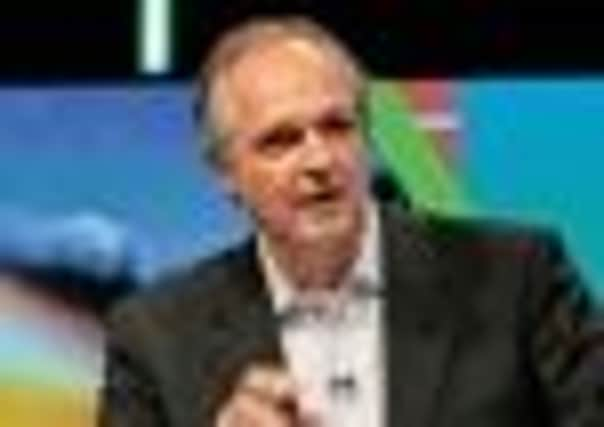Unilever policy paying off as shares hit high


The consumer goods giant, led by Paul Polman, is beating its rivals and a dull economic backdrop by focusing its marketing on the personal and home care sectors, which are skewed more to high-growth regions like Latin America and Asia and grew around 10 per cent in 2012.
“We’re making much clearer choices – allocating resources, and concentrating where we see the most potential,” said chief financial officer Jean-Marc Huet.
Advertisement
Hide AdAdvertisement
Hide Ad“It could be the launch of Tresemme hair care products in Brazil, Indonesia, India. It could be the launch of this product in the US, Magnum ice cream in the Philippines, Bertolli Gold olive oil spread in the Nordics, the UK – the list continues.”
Dove Damage Therapy haircare and Rexona Maximum Protection deodorant had been stand-out successes in 2012, the company said, while it is promoting its new Axe/Lynx Apollo deodorant with a global competition offering a trip into space.
Unilever has a research and development centre and deodorants manufacturing site in Leeds employing 600 people in the production of Sure, Dove, Lynx and Impulse.
Shares were up 3 per cent at 2,527p at lunchtime, a record high for the company, born 83 years ago out of the merger of Sunlight Soap and foods maker Lever Brothers and Dutch group Margarine Unie.
Advertisement
Hide AdAdvertisement
Hide AdNow it is the spreads business – Flora margarine, and others – which is more exposed to sluggish developed markets and the biggest drag on the company’s growth, with the foods business growing a comparatively weak 1.8 per cent last year. “In spreads we’re focused on recovering the volumes. We’ve taken some pretty serious price actions,” said Mr Huet.
He cautioned that overall markets still remained tough, with no room for complacency.
“In 2013 the markets in which we operate will continue to be difficult. Competition will remain intense and consumers are still feeling very much the effects of austerity measures,” he said. The maker of Ben & Jerry’s ice-cream said overall 2012 underlying sales grew 6.9 per cent, beating forecasts of 6.5 per cent.
Emerging markets, which make up around 55 per cent of the company’s turnover, grew 11.4 per cent.
Advertisement
Hide AdAdvertisement
Hide AdThat performance contrasts with rivals that have been slower to move into fast-growth regions. Unilever’s main household products rival Procter & Gamble is shedding jobs, and French yoghurt maker Danone may do the same as the European economic downturn weighs on its business.
Unilever did not give a specific outlook for 2013, but repeated its mantra of focusing on growing ahead of its markets, on steady core operating margin improvement and on strong cash flow.
“As expected, 2013 guidance was the standard and somewhat vague,” said analyst Andrew Wood at Bernstein.
“Management remains cautious on the markets and competition, but that was no different to its position 12 months ago.
Advertisement
Hide AdAdvertisement
Hide Ad“Still, it will be tough for Unilever to repeat 2012’s success, especially on the top line.”
Analysts at Shore Capital retained their ‘buy’ rating on the stock, saying that despite the high valuation, Unilever’s investment potential remained “in its infancy”, pointing to the company’s emerging markets exposure and sustained margin expansion.
Core operating margin grew to 13.8 per cent in 2012, bettering many analyst predictions, as Unilever said it stayed “rigorous” on driving down costs.
Raw material cost rises were expected to be between low and single digits in 2013, Huet said.
Advertisement
Hide AdAdvertisement
Hide AdSales for the full year were up 10.5 per cent at 51.3 billion euros, while core earnings per share rose 11 per cent to 1.57 euros, both in line with forecasts.
Shares closed last night up 75p at 2.526p.
Turnover milestone
CHIEF executive Paul Polman said the 2012 results were achieved in tough economic conditions in an intensely competitive environment with volatile commodity costs.
He said: “We continued to invest behind our brands, again increasing advertising and promotions spend.”
Unilever saw growth in all categories and all geographies and achieved a good overall balance between volume and price, it said.
Advertisement
Hide AdAdvertisement
Hide AdFast-growing emerging markets helped the company exceed the 50 billion euro turnover figure, which Mr Polman described as “an important milestone” in his plan to double the size of Unilever from 40bn euros to 80bn euros.